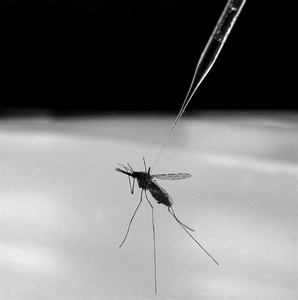Disease resistance successfully spread from modified to wild mosquitoes
NIAID-funded group assesses mating of genetically modified species
Using genetically modified (GM) mosquitoes to reduce or prevent the spread of infectious diseases is a new but rapidly expanding field of investigation. Among the challenges researchers face is ensuring that GM mosquitoes can compete and mate with their wild counterparts so the desired modification is preserved and spread in the wild population. Investigators at Johns Hopkins University have engineered GM mosquitoes to have an altered microbiota that suppresses human malaria-causing parasites. These GM mosquitos preferred to mate with wild mosquitoes and passed along the desired protection to many generations of offspring.

Anopheles gambiae mosquito being injected with hemolymph for malaria research study.
The research was funded by the National Institute of Allergy and Infectious Diseases (NIAID), part of the National Institutes of Health.
The researchers genetically modified Anopheles mosquitoes, which in nature spread the malaria-causing parasite Plasmodium. The team caged equal numbers of wild and GM mosquitoes and monitored their breeding over 10 generations. Ninety percent of the offspring in each generation passed along the GM trait. Even when combining 10 percent GM with 90 percent wild mosquitoes, the Plasmodium-resistance trait dominated after a few generations. Importantly, the GM mosquitoes maintained their resistance to the malaria parasite for 7 years.
The group also showed that the change in the microbiota resulted in a mating preference among the GM and wild mosquitoes. GM males showed a preference for wild females and wild males preferred GM females; these preferences contributed to the spread of the desired protective trait within the mosquito population.
The authors note that work was conducted in a laboratory setting and that more research is needed to determine if what they observed in the laboratory also will occur under natural conditions. Nevertheless, the study suggests that mosquitoes can be genetically modified to compete in nature with wild populations and spread resistance to the malaria-causing parasite. If implemented, this strategy could eventually result in decreased disease transmission to humans.
Source: U.S. National Institutes of Health
- 331 reads
Human Rights
Ringing FOWPAL’s Peace Bell for the World:Nobel Peace Prize Laureates’ Visions and Actions

Protecting the World’s Cultural Diversity for a Sustainable Future

The Peace Bell Resonates at the 27th Eurasian Economic Summit

Declaration of World Day of the Power of Hope Endorsed by People in 158 Nations

Puppet Show I International Friendship Day 2020

